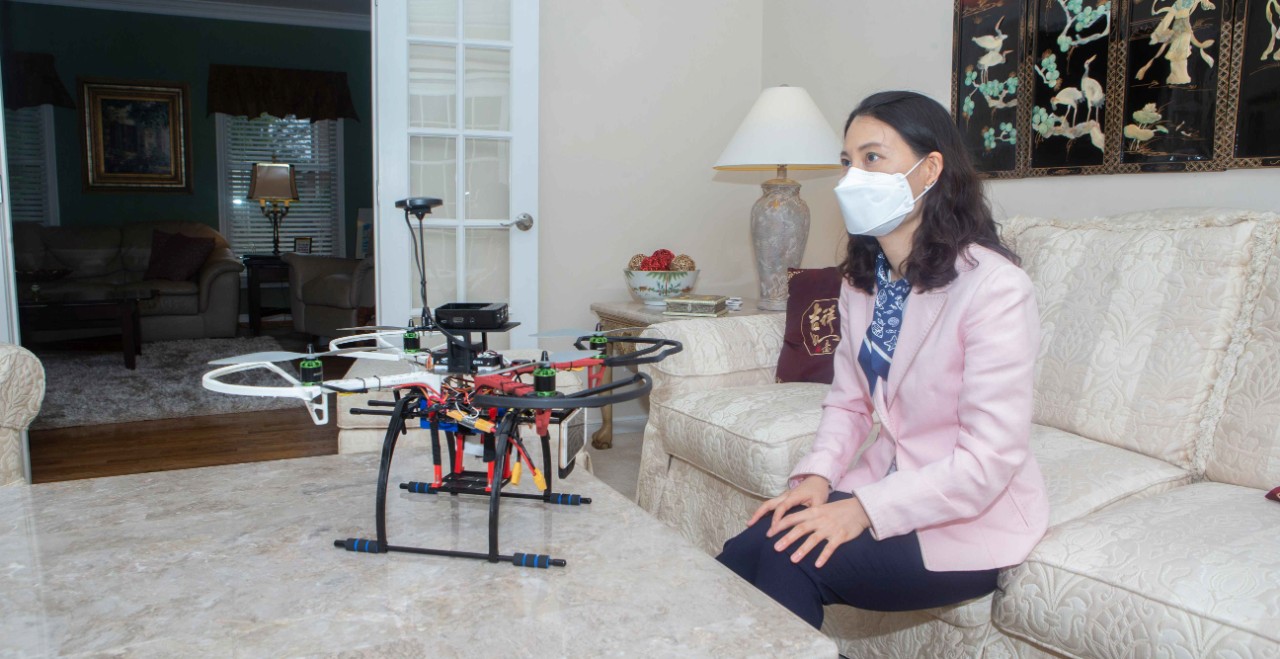
Forbes: UC telehealth drone can make house calls
A multidisciplinary team of researchers is engineering new technology
Telehealth medicine has become increasingly popular during the COVID-19 pandemic as doctors and patients turned to virtual appointments as a means to communicate more safely.
Forbes highlighted research by a multidisciplinary team of inventors at the University of Cincinnati that is aiming to improve the technology to make these virtual interactions more meaningful.
Inventors Victoria Wangia-Anderson, Manish Kumar, Seung-Yeon Lee and Debi Sampsel from three colleges at UC collaborated to develop a semi-autonomous drone that can be dispatched to people’s homes. The drones are big enough to carry medicine or medical supplies but small enough to maneuver the tight confines of a home using navigational algorithms developed by UC engineers.
Still in development, the drone has cameras and a display screen so patients can talk to health care professionals from the comfort of their home. The prototype carries a waterproof box the size of a small first-aid kit to deliver medical supplies or collect self-administered lab tests.
The researchers in UC’s College of Nursing, College of Allied Health Sciences and College of Engineering and Applied Science secured a UC Office of Research grant to develop a prototype to test the feasibility of dispatching a telehealth care delivery drone to a patient's home to provide health assessments or medical interventions.
Featured image at top: Seung-Yeon Lee, an associate professor of nutrition sciences in UC's College of Allied Health Sciences, sits across from a telehealth drone that allows patients to talk face-to-face to health care professionals from the comfort of their home. Photo/Joseph Fuqua II/UC Creative + Brand

UC's prototype telehealth drone. Photo/Joseph Fuqua II/UC Creative + Brand
Related Stories
UC scholarship recipients and donors enjoy bond
July 24, 2025
On a bright spring day at the University of Cincinnati’s Uptown Campus, Kim Dobbs, BSED ’78, and a group of students greet each other with smiles and hugs. They chat about summer plans and a shared appreciation for Mexican food. These student-athletes benefit from scholarships created by Kim and her late husband, Robert (Bob) Dobbs, BBA ’76, MBA ’88. In 2024, Dobbs made a planned gift supporting four scholarships for student-athletes on UC’s dance team, women’s tennis, the volleyball team and UC cheerleaders. These scholarships have supported 15 students since their inception. Dobbs has been giving to the university since 1978.
Community disadvantage linked to increased motor symptom...
July 24, 2025
Neurology Live highlighted research led by the University of Cincinnati's Emily Hill that found community disadvantage was associated with worse motor symptom severity and motor disability in patients with Parkison disease (PD) and atypical parkinsonisms.
Managing outpatient challenges for hypertensive intracerebral...
July 23, 2025
The University of Cincinnati Gardner Neuroscience Institute's Yasmin Aziz, MD, was featured in a MedCentral article discussing the challenges of managing hypertensive intracerebral hemorrhage in outpatient settings.
